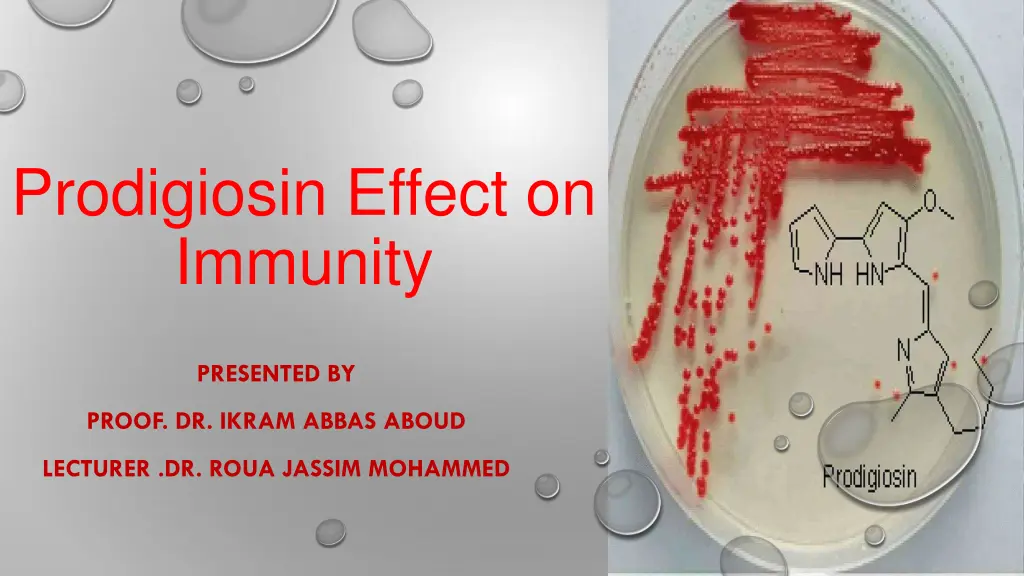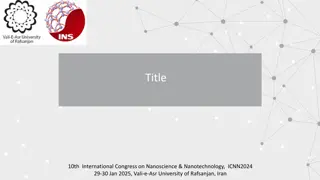
Prodigiosin: Impact on Immunity and Potential Applications
Explore the immunomodulatory effects of prodigiosin, a red dye produced by certain bacteria. Discover its potential as an anti-fungal, anti-bacterial, and anti-cancer agent, as well as its immunosuppressive properties. Learn how prodigiosin could be a revolutionary replacement for natural pigments in various industries.
Download Presentation

Please find below an Image/Link to download the presentation.
The content on the website is provided AS IS for your information and personal use only. It may not be sold, licensed, or shared on other websites without obtaining consent from the author. If you encounter any issues during the download, it is possible that the publisher has removed the file from their server.
You are allowed to download the files provided on this website for personal or commercial use, subject to the condition that they are used lawfully. All files are the property of their respective owners.
The content on the website is provided AS IS for your information and personal use only. It may not be sold, licensed, or shared on other websites without obtaining consent from the author.
E N D
Presentation Transcript
Prodigiosin Effect on Immunity PRESENTED BY PROOF. DR. IKRAM ABBAS ABOUD LECTURER .DR. ROUA JASSIM MOHAMMED
INTRODUCTION: Prodigiosin red dye produced by many strains of the bacterium Serratia marcescens and rubidaea as well as other Gram-negative , gamma proteobacteria such as Vibrio and Gram-positive (e.g. Streptomyces) It is responsible for the pink tint occasionally found in grime that accumulates on porcelain surfaces such as bathtubs, sinks is a secondary metabolite and
Insoluble solvent in water, like: but soluble alcohol, in chemical chloroform. This pigment are kept to red color in dark for long time because prodigiosin is sensitive to light Prodigiosin has potential clinical interest because it is reported to have anti-fungal, anti-bacterial, anti- protozoal/antimalarial, immunosuppressive and anti- cancer activities
Prodigiosin could be a replacement of natural pigments to synthetic colorants for possible application in the food industry Prodigiosin was observed to increase the sunscreen protection factors (SPF) which have photo-protective activity
Immunomodulatory effect of prodigiosin PRODIGIOSIN Boost the immune system Immunosuppression
PGIs a powerful immunomodulator that affects lymphoreticular cells, including B cells, T cells, and macrophages. at high concentrations, function as a mitogen. at low concentration has been discovered to have immunosuppressive effects on immunological responses
Mechanism of Action of Prodigiosin as a Mitogen: 1. Activation of Signal Transduction Pathways: Prodigiosin can interact with cellular signal transduction pathways, particularly those related to the mitogen-activated protein kinase (MAPK) pathway. It is believed that prodigiosin activates the ERK (extracellular signal-regulated kinase) pathway, which plays a significant role in promoting cell proliferation. 2. Induction of Cell Cycle Progression: Prodigiosin has been shown to induce progression through the cell cycle, particularly the transition from the G1 phase to the S phase. This occurs through the modulation of cyclin-dependent kinases (CDKs), which are important regulators of cell cycle progression.
3. Regulation of the p53 and p21 Pathways: Prodigiosin has been observed to influence the tumor suppressor protein p53, a key regulator of the cell cycle and apoptosis. In some cases, prodigiosin reduces the expression of p53, thus promoting the progression of the cell cycle. Additionally, prodigiosin effects on the cyclin-dependent kinase inhibitor p21 can impact cell cycle progression. 4. Proliferative Effect on Immune Cells: Prodigiosin also acts as a mitogen for certain immune cells, such as T lymphocytes. It can trigger the proliferation of these cells by interacting with cell surface receptors that initiate signaling cascades leading to DNA synthesis and cell division.
5. Induction of Reactive Oxygen Species (ROS): Like many mitogens, prodigiosin induces the generation of reactive oxygen species (ROS). These ROS can activate cellular signaling pathways, such as the MAPK pathway, that promote cell proliferation. However, excessive ROS can also lead to cellular damage and apoptosis, suggesting that the mitogenic effect may be context-dependent. 6. Modulation of Protein Kinases: Prodigiosin may interact with other protein kinases, such as serine / threonine kinases. These kinases are crucial for controlling cell growth, survival, and metabolism. The activation of these kinases leads to enhanced cell division.
Mechanism of Prodigiosin as an Immunosuppressive Agent: 1. Inhibition of T-Cell Proliferation: Prodigiosin has been shown to inhibit the proliferation of T-cells. It does so by blocking the activation and division of these immune cells, which are crucial for adaptive immune responses. By acting as a mitogen for immune cells, prodigiosin initially stimulates T-cell proliferation, but at higher concentrations, it causes T-cell apoptosis, reducing their number and suppressing immune responses.
2. Induction of T-Cell Apoptosis: Prodigiosin induces apoptosis in T-cells by activating pro-apoptotic pathways. This occurs through mitochondrial dysfunction, increased expression of caspases (proteins involved in the cell death process), and alteration of cell survival pathways (e.g., through the Fas receptor). This results in the elimination of activated T-cells and contributes to the immunosuppressive effect. 3. Modulation of Cytokine Production: Prodigiosin affects the production of various cytokinesFor example, it has been shown to reduce the secretion of pro-inflammatory cytokines like IL- 2 (Interleukin-2), a key regulator of T-cell growth and differentiation. By suppressing these cytokines, prodigiosin dampens the immune response.
4. Inhibition of NF- B Pathway: The NF- B (Nuclear Factor kappa-light-chain-enhancer of activated B cells) signaling pathway is crucial for immune cell activation, survival, and the production of inflammatory cytokines. Prodigiosin inhibits the NF- B pathway, which reduces the expression of pro-inflammatory genes and cytokines, thereby exerting an immunosuppressive effect. 5. Regulation of Regulatory T-Cells (Tregs): Some studies suggest that prodigiosin may induce the expansion of regulatory T-cells (Tregs), which are a subset of T-cells that maintain immune tolerance and suppress excessive immune responses. By promoting the expansion of Tregs, prodigiosin could contribute to an immunosuppressive environment, further reducing inflammation and preventing autoimmune responses.
6. Suppression of Macrophage Activation: Prodigiosin has been shown to affect macrophage activation, reducing their ability to produce pro-inflammatory cytokines and engage in phagocytosis effectively. Macrophages play a central role in immune responses, and their inhibition immunosuppression. can contribute to overall 7. Interaction with Reactive Oxygen Species (ROS): Like many immunosuppressive agents, prodigiosin can induce the generation of reactive oxygen species (ROS). While ROS are important in fighting pathogens, they can also lead to cellular damage and trigger apoptotic signaling in immune cells. This accumulation of ROS further supports prodigiosin role in suppressing immune responses.
CONCLUSION: Prodigiosin potential for immune system by modulating both T-cell and B-cell , make it important compound for understanding immune system and cellular growth. prodigiosin can dampen immune responses, making it useful in controlling overactive immune conditions such as autoimmune diseases or organ transplantation rejection.






















